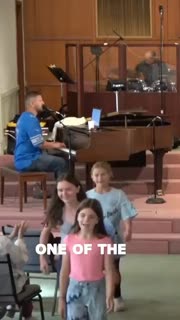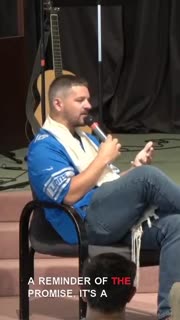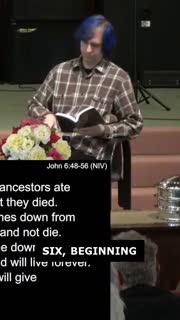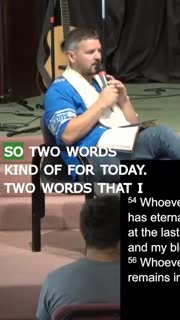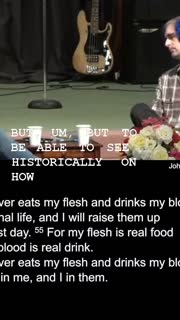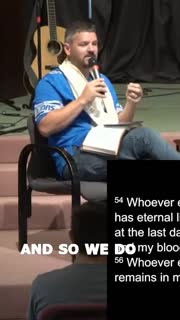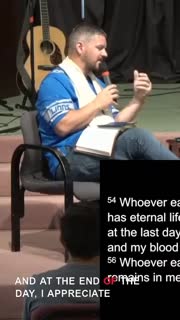Embracing the Mystery and Grace of Communion
Devotional
Sermon Summary
Bible Study Guide
Sermon Clips
1. "One of the things that really kind of stood out to me this last week at camp was, so Lighthouse was something that we sang at the fire time a time or two, but it was right after Andrew McCune kind of helped lead the banana song, and then just this really crazy nonsense songs, and then all of a sudden on a dime, they're all just getting crazy and jumping, and all of a sudden they're singing Heart of Worship, and they're crying and holding and swaying back and forth. The spirit was just really incredible, and it was just a reminder to me that God is not always in the serious parts, but he's also present in some of the goofy, and even when people get thrown into lakes, he's in that." [18:01] (44 seconds)
2. "It's a reminder of the promise. It's a reminder of the Passover and the history. But it doesn't replace that. And there's something that N.T. Wright shared that really stuck with me. He said, He said God's new covenant came out of and within the old covenant and the old traditions. And so that God uses what already is to bring about new things." [31:29] (28 seconds)
3. "And to see, like, oh, and I remember as a kid, too, like, oh, I'm going to be last so I can be first. And that's kind of what happened, too. Like, they all tried to go on strike and they all tried to have the worst cabin so that they could have the best one. And that's missing the message that Jesus said. Jesus was, you know, preaching. And so that was something that has stuck out to me for sure during this series on that, like, just throwing the metrics out all together. It's like this. It's a system that, you know, humans put in play. And Jesus is, like, at the table. It's not. There's not a system. It's not this hierarchy of first and last." [33:25] (35 seconds)
4. "So John chapter six, beginning in verse 48, Jesus says, I am the bread of life. Your ancestors ate the manna in the wilderness, yet they died. But there is the bread that comes down from heaven, which anyone may eat and not die. I am the living bread that came down from heaven. Whoever eats this bread will live forever. This bread is my flesh, which I will give for the life of the world. Then the Jews began to argue sharply among themselves. How can this man give us flesh to eat? Jesus said to them, very truly. I tell you, unless you eat. The flesh of the son of man and drink his blood, you have no life in you. Whoever eats my flesh and drinks my blood has eternal life, and I will raise them up at the last day for my flesh is real food and my blood is real drink. Whoever eats my flesh and drinks my blood remains in me and I in them." [40:26] (60 seconds)
5. "So two words kind of for today. Two words that I want. I want you to go away with, um, is sacrament, which comes from the Latin, the means of grace. And the other word is mysterion, I think, or, uh, that's the Greek word. Um, and that's sacrament isn't really in scripture, um, or in the Bible, but it, it comes in the first few centuries. I took, you know, more Greek than I do. I've never taken any Greek class. I don't even know the Greek alphabet. All right. Here's slight tangent here. Um, biblical language. I had a theology professor. I think I've shared this with you before, but he said, if it's kind of ambiguous in the English, it's ambiguous in the Greek too. And that's something we just assume and like, oh, if we go back to the original language, we can get the true meaning like, man, then you have words like Sigma and Ohio, you know, in like 500 years is they're thinking, oh, like, like Ohio was a state. No, Ohio is like being a state that is long past. You can't, there's a mystery there." [45:36] (87 seconds)
6. "But, um, but to be able to see historically on how this has all kind of come to fruition and these rituals that take place, that God somehow gives us this, this means of grace. Um, and so in sacrament, there's three ways. Um, there's three ways that I have written down that God works through this. The first one is that like sacraments confer grace. like ex opera operetto. That's what you said. Like I'm using Latin words and it would be boring. I don't even know what those words mean. But it's from the, the words are from the work, worked. So that, so in communion, you mentioned like the priest blesses it and then God's grace is present. So this first one is that there's power somehow in the priests. Priests, I mean, obviously not in our church because, you know, if it were up to us to somehow give God's grace on the, on the communion, people might be in trouble. So there's power in the priest and everything's prepared perfectly. And that's where God's grace comes in. The second one is then sacraments confer grace, but only when received. So you have to come with a faithful heart to receive it. So like the, it's on you all as you come to the table. It's less on the priest and more on you receiving in faith. And then the third one is that sacraments are a witness to a grace already received. And so those three ways, when you think about the sacraments, when you think about baptism or communion, the things, these are the things that everybody, that all the churches agree on is like, hey, yeah, there is a mystery. There's a mystery of God's grace that, you know, God commanded these two things." [49:17] (115 seconds)
7. "And so we do them first off because he commanded them. But then second, because there's something there for us. There's this mystery of receiving God's grace through that. But I, I continue to wrestle a little bit with, you know, with that. Is it just symbolic? You know, there's at camp this week, I, you know, like we talked about using goldfish and Mountain Dew, you know, as communion. And so like that, that is symbolic. But if we, David, if we only do that, is there power in the preparation of it? You know, like in realizing that it is sacred, it's not just merely symbolic. And is there then, you know, work on our part? Does God's grace, is it present only when we come with a faithful heart ready to receive it? And I go kind of back and forth and all of that. And at the end of the day, I appreciate all the traditions." [50:14] (56 seconds)
8. "And how, you know, we, we view and we experience sacrament. Because I do think God is not bound by a box, but that God does kind of work in and through. And God's grace somehow is present in all three of those ways. We've gathered together. We've heard the word. Now we come to the table. Anytime during the next two songs, you're invited to come to receive the elements, the bread and the juice. Invited to come to bring offerings forward. We have offering boxes at the front and the back for any tithes or offerings. Invited to come to pray at the altar. We have candles in the back that you can light as a prayer also. Feel free to stand, to sit, to kneel, to sing, to be quiet. This is a time to respond to God's word. So we come to the table this morning." [50:14] (60 seconds)
Ask a question about this sermon
2. "It's a reminder of the promise. It's a reminder of the Passover and the history. But it doesn't replace that. And there's something that N.T. Wright shared that really stuck with me. He said, He said God's new covenant came out of and within the old covenant and the old traditions. And so that God uses what already is to bring about new things." [31:29] (28 seconds)
3. "And to see, like, oh, and I remember as a kid, too, like, oh, I'm going to be last so I can be first. And that's kind of what happened, too. Like, they all tried to go on strike and they all tried to have the worst cabin so that they could have the best one. And that's missing the message that Jesus said. Jesus was, you know, preaching. And so that was something that has stuck out to me for sure during this series on that, like, just throwing the metrics out all together. It's like this. It's a system that, you know, humans put in play. And Jesus is, like, at the table. It's not. There's not a system. It's not this hierarchy of first and last." [33:25] (35 seconds)
4. "So John chapter six, beginning in verse 48, Jesus says, I am the bread of life. Your ancestors ate the manna in the wilderness, yet they died. But there is the bread that comes down from heaven, which anyone may eat and not die. I am the living bread that came down from heaven. Whoever eats this bread will live forever. This bread is my flesh, which I will give for the life of the world. Then the Jews began to argue sharply among themselves. How can this man give us flesh to eat? Jesus said to them, very truly. I tell you, unless you eat. The flesh of the son of man and drink his blood, you have no life in you. Whoever eats my flesh and drinks my blood has eternal life, and I will raise them up at the last day for my flesh is real food and my blood is real drink. Whoever eats my flesh and drinks my blood remains in me and I in them." [40:26] (60 seconds)
5. "So two words kind of for today. Two words that I want. I want you to go away with, um, is sacrament, which comes from the Latin, the means of grace. And the other word is mysterion, I think, or, uh, that's the Greek word. Um, and that's sacrament isn't really in scripture, um, or in the Bible, but it, it comes in the first few centuries. I took, you know, more Greek than I do. I've never taken any Greek class. I don't even know the Greek alphabet. All right. Here's slight tangent here. Um, biblical language. I had a theology professor. I think I've shared this with you before, but he said, if it's kind of ambiguous in the English, it's ambiguous in the Greek too. And that's something we just assume and like, oh, if we go back to the original language, we can get the true meaning like, man, then you have words like Sigma and Ohio, you know, in like 500 years is they're thinking, oh, like, like Ohio was a state. No, Ohio is like being a state that is long past. You can't, there's a mystery there." [45:36] (87 seconds)
6. "But, um, but to be able to see historically on how this has all kind of come to fruition and these rituals that take place, that God somehow gives us this, this means of grace. Um, and so in sacrament, there's three ways. Um, there's three ways that I have written down that God works through this. The first one is that like sacraments confer grace. like ex opera operetto. That's what you said. Like I'm using Latin words and it would be boring. I don't even know what those words mean. But it's from the, the words are from the work, worked. So that, so in communion, you mentioned like the priest blesses it and then God's grace is present. So this first one is that there's power somehow in the priests. Priests, I mean, obviously not in our church because, you know, if it were up to us to somehow give God's grace on the, on the communion, people might be in trouble. So there's power in the priest and everything's prepared perfectly. And that's where God's grace comes in. The second one is then sacraments confer grace, but only when received. So you have to come with a faithful heart to receive it. So like the, it's on you all as you come to the table. It's less on the priest and more on you receiving in faith. And then the third one is that sacraments are a witness to a grace already received. And so those three ways, when you think about the sacraments, when you think about baptism or communion, the things, these are the things that everybody, that all the churches agree on is like, hey, yeah, there is a mystery. There's a mystery of God's grace that, you know, God commanded these two things." [49:17] (115 seconds)
7. "And so we do them first off because he commanded them. But then second, because there's something there for us. There's this mystery of receiving God's grace through that. But I, I continue to wrestle a little bit with, you know, with that. Is it just symbolic? You know, there's at camp this week, I, you know, like we talked about using goldfish and Mountain Dew, you know, as communion. And so like that, that is symbolic. But if we, David, if we only do that, is there power in the preparation of it? You know, like in realizing that it is sacred, it's not just merely symbolic. And is there then, you know, work on our part? Does God's grace, is it present only when we come with a faithful heart ready to receive it? And I go kind of back and forth and all of that. And at the end of the day, I appreciate all the traditions." [50:14] (56 seconds)
8. "And how, you know, we, we view and we experience sacrament. Because I do think God is not bound by a box, but that God does kind of work in and through. And God's grace somehow is present in all three of those ways. We've gathered together. We've heard the word. Now we come to the table. Anytime during the next two songs, you're invited to come to receive the elements, the bread and the juice. Invited to come to bring offerings forward. We have offering boxes at the front and the back for any tithes or offerings. Invited to come to pray at the altar. We have candles in the back that you can light as a prayer also. Feel free to stand, to sit, to kneel, to sing, to be quiet. This is a time to respond to God's word. So we come to the table this morning." [50:14] (60 seconds)
